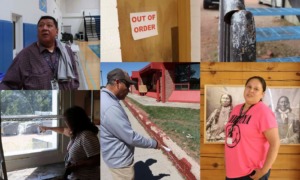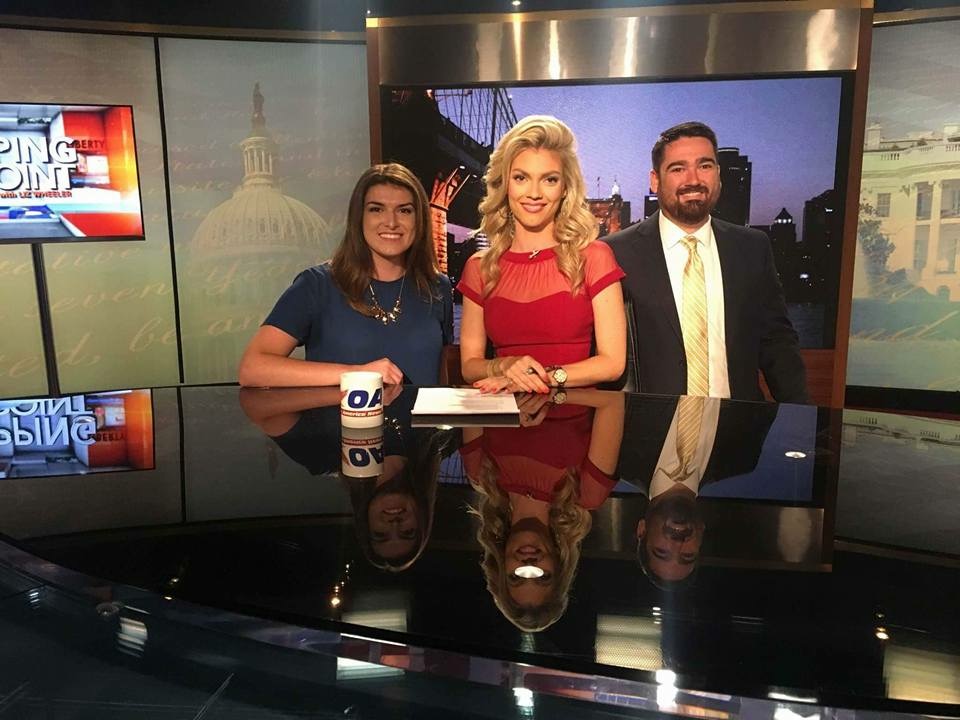
Brooke Paz
Left to right: Amanda McGuire, president of what was then the California College Republicans Club; Liz Wheeler, host of “Tipping Point” on One America News Network; and Ryan Hoskins, a club member.
LOS ANGELES — Colleges are becoming ideological battlegrounds. A national survey of freshman students found the incoming 2016 class was the most politically extreme in 51 years. And in famously liberal California, long a haven of progressive universities, a campus conservative movement is channeling the same underdog energy the Trump campaign commanded.
Last year attendance soared at the meetings of the California College Republicans Club at California State University at Fullerton (CSUF) in Orange County. (The club dechartered from California College Republicans on May 2, so is no longer officially affiliated with the Republican Party.) Following accusations in February 2018 that a professor had physically assaulted a student with conservative views — no charges were ultimately filed — the group’s sense of vulnerability galvanized into purpose.
Early in the fall semester of 2017, the student group of about 40 people hosted Milo Yiannopoulos, the conservative firebrand. He spoke at California Polytechnic State University in San Luis Obispo on April 26, with no arrests or fights and few protesters.
“You have an institution that is funded by the government through subsidies, aka student loans, and has managed to become ‘97 percent left,’” joked Aaron Van Meter-Jones — who identifies as a libertarian — of CSUF.
Amanda McGuire, president of the College Republicans Club, shares his sensibility: “Faculty make a lot of assumptions that people all think the way they do.”
When faculty claim, “‘I don’t like Trump either,’” she said, “It’s telling the crowd ‘I agree with you and see your point of view.’”
Not a welcoming environment
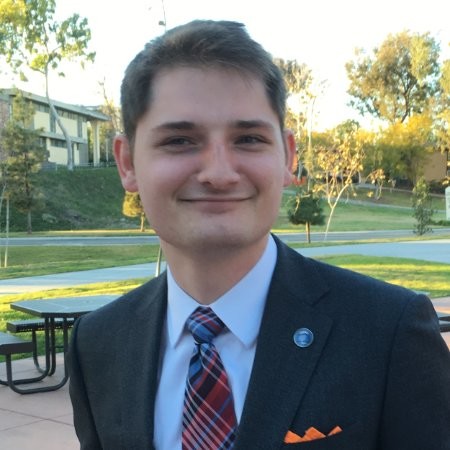
Aaron Van Meter-Jones
McGuire calls this virtue signaling, deference to an assumed sense of shared liberalism. She argues that it ultimately suggests to students that right and wrong can be clearly mapped on the political spectrum, based on what authority figures do say, don’t say and even merely suggest. In short, to conservative students, professors are saying the right wing is wrong.
When faculty “say that ‘We all know that that’s wrong’ and that might be believing in God, to a conservative it kind of gives a feeling that the environment isn’t welcoming to them,” she said.
Campuses are seeing a surge in polarized political views. Fewer students in the incoming freshman class of 2016 considered themselves politically moderate than ever before, according to a survey taken by the Higher Education Research Institute at the University of California at Los Angeles. Just over 20 percent of freshmen identified as “conservative or far right” while approximately 35 percent identified as “liberal or far left” — levels that haven’t been seen since the Vietnam war.
And gender is playing a significant role. An all-time high of 41.1 percent of women identified as “liberal” or “far left.”
For campus conservatives, provocateurs like Yiannopoulos appeal to their diminished willingness to reach across the aisle. The UCLA survey found that among freshmen class of 2016, 87 percent of left-leaning students tolerate others with different beliefs, while only 68 percent of right-leaning students do.
The Yiannopoulos event was a show of power. It brought a sold-out crowd and police from several other campuses, the city of Fullerton, the California Highway Patrol, and the local sheriff’s department. The administration allowed it in the name of free speech, at no small cost.
Administrators blamed for speech
Liz Sanchez, a graduate student in sociology at CSUF, is researching ways to help nonprofit organizations develop programs to “deal with the alt-right.” Sanchez, who uses the pronoun they, started as an activist among the LGBTQ community. Now they focus on anti-Trump issues as an intern for the organization Students for Quality Education (SQE).
Sanchez blames last fall’s Milo Yiannopoulos speech that occurred squarely on the administrators. The university allowed it for fear of a lawsuit, they said. Since the 2016 election, the school’s leadership has shied away from the legal controversy of denying admission to speakers, at the expense of minority students, they said.
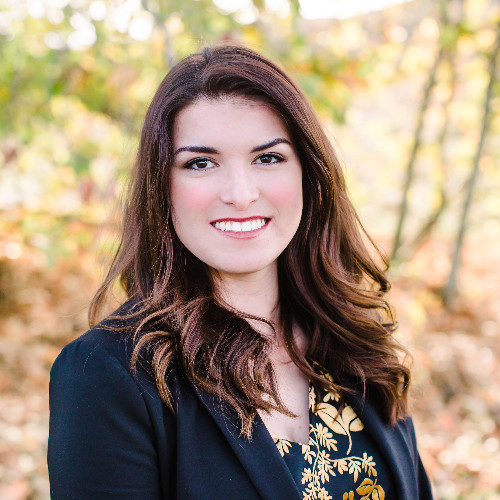
Amanda McGuire
While Sanchez vehemently opposes Yiannopoulos’ habit of ostracizing trans students and “hate speech” in general, the real issue is the university’s allocation of funds for the event and its management of its venue.
SQE has focused on organizing a coalition of student groups in opposition to the newly empowered right. The coalition advocates for free tuition, opposes the repeal of DACA and pushes for more diversity among faculty. Sanchez, who considers SQE’s opponents to be motivated by “Western supremacy,” believes that the fight centers on funding.
In the dystopian future of education Sanchez imagines, “all universities are gonna be half-mall, half-classrooms. That’s the problem. We have lost control of public universities.”
Leftist groups recruit on campus
This skepticism toward institutional leadership is shared by activists who actively recruit at California colleges.
Refuse Fascism, a national activist group in opposition to the Trump administration, ran an information table at the Unity Block Party that served as the counter-protest to the Yiannopoulos event last fall.
By phone, an anonymous representative from Refuse Fascism’s Los Angeles office said the organization is committed to “stop the nightmare” by doubling down on their objective to “drive the Trump regime out of power.” They plan to do so “by protesting, by refusing to go along with everything the administration represents.”
Writer “Ann Coulter is labeled a conservative,” the speaker said while a voice yelled indiscernible words into a megaphone in the background. “But her content calls for genocide. It’s the same regime as Trump or fascism.”
Refuse Fascism has been organizing mass protests since the election of Trump, with their Nov. 4 event in Los Angeles’ Pershing Square being among the largest.
For Sanchez and the loose but potent confederacy of “far left” students fighting the powers that be at CSUF, the coming midterm elections are a critical opportunity to make their voice heard. Considering the well-recorded political struggle in which Orange County’s changing demographics are making it a national political battleground, their prospects might be good.
In the 2016 election, Hilary Clinton won Orange County’s vote at 51 percent to Trump’s 43 percent. It was the first time a Democratic candidate had won the county since Franklin D. Roosevelt in 1936. And it was a decisive victory in a battle for Orange County that had been raging since Mitt Romney had beaten Obama in 2012 by a mere 6 points.
Students on both sides feel threatened
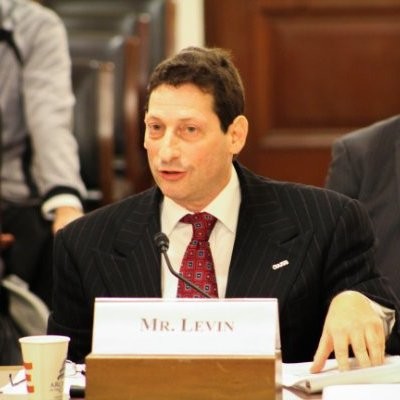
Brian Levin
As power changes hands, students with a newly earned sense of political identity have a growing awareness of instability. Couple that instability with the pervasive tendency toward extreme political perspectives and a sense of vulnerability looms.
All the CSUF students interviewed said they feel threatened on campus.
With some state protests turning violent, how youth act on their polarized beliefs becomes a cause for concern.
Brian Levin, director of the Center for the Study of Hate and Extremism at CSU San Bernardino noted the social ecosystem of hate is changing. In the past it has been reliably true that those acting out violently on their beliefs are less likely to be college educated and mostly commit violent acts between the ages of 26 and 45. But with polarization occurring at a younger age that could be changing.
“There is a concerted effort to target the younger demographic,” Levin stated of the extremist groups he studies. “You’re going to see extremism at a younger age.”
Van Meter Jones admits that there is little room for moderation on campus. And this polarization is fueling a drama of ideology of historical significance.
“What happens on college campuses across the country in the next 10 years will in fact determine where this country is headed over the next century,” Van Meter Jones said.
This story has been updated.




